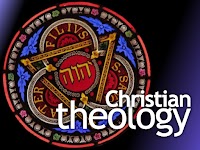- THEOLOGY
θi'ɑl.ə.dʒi noun The study of God, his nature, and related religious beliefs. - 2. One’s religious beliefs and theories, when systematically organized and developed.
- [theological
θi.ə'lɑ.dʒə.k(ə)l adjective, theologianθi.ə'loʊ.dʒən noun, theologistθi'ɑl.ə.dʒəst noun]

As you can see,
I talk about theology as Christianity’s collective study of God, and people think I’m talking about their theology, their beliefs about who God is. Or I’ll ask people about their theology, and they’ll respond, “Well it’s not what I believe; it’s what all true Christians believe”—as if other Christians aren’t permitted their own opinions. (Too often, to their minds, we’re not.)
And then there’s how
- SHE. “Whoa, whoa, whoa. I don’t do theology.”
- ME. “You don’t have beliefs about God?”
- SHE. “I do, but I don’t do theology.”
- ME. “What do you think theology is?”
- SHE. “Dogmas. Doctrines. Whatever you call them. I don’t have those. I don’t do those.”
- ME. “Okay. That’s not what I mean by ‘theology.’ Theology is either the study of God, or your own personal beliefs about God. And you do have personal beliefs about God, so you have a theology.”
- SHE. “Personal beliefs about God? What, I have a theology and you have a theology?”
- ME. “And everybody else has a theology. Which may or may not line up with some church’s doctrines or dogmas.”
- SHE. “I don’t think that’s what anybody else means by ‘theology.’ ”
- ME. “Check a dictionary. I’m going off the dictionary definition. If people believe ‘theology’ means something else… well that’s their theology.”
You’ll notice this hypothetical pagan is kinda wary about
And okay, figuring out what to believe is indeed the purpose of theology. We’re studying God because every single one of us
There are a number of ways we go about that study. First, we pick a religion. Usually it’s the one we grew up in; I grew up Christian, so I went with Christianity. Sometimes it’s the one we adopt later in life—I didn’t grow up Pentecostal, but I was going to a Pentecostal church, and figured if I was gonna study theology it should be at a Pentecostal seminary, so off I went. (And, as it turned out, all their theology professors were
Next we determine what, in that religion, is authoritative. For some it’s the leadership, or the current heads of the religion. For others there are traditions and scriptures. In Christianity, the current head of our religion is Christ Jesus. (He’s not dead, you know!) We gotta follow him—and there are scriptures containing his teachings; plus the writings of the apostles he trained; plus the prophets who wrote their own God-experiences, provided Jesus his cultural background, and of course foretold him.
And, depending on your sect in that religion, there are various traditions which influence how you understand things. My Pentecostal traditions admittedly, definitely affect how I understand the scriptures. Other traditions—fr’instance
Why we study theology.
From time to time I’ll encounter a Christian who really doesn’t understand why they need to bother with theology. Just tell ’em what to believe, and they will!
I can usually blow up that assumption by pointing out, “What if your pastor starts teaching
Yeah, there are a lot of Christians who just swallow everything our preachers tell us. When I was a kid I made that mistake too; I didn’t yet know to double-check my pastors against the bible. I quickly learned it was necessary, ’cause my pastors were a little sloppy, and made the occasional factual error—they’d mix up Elijah and Elisha, or misquote a bible verse I had memorized, or otherwise make very understandable, very human mistakes. Kids love to fact-check adults, so I had fun with it for a few years. But as I got older, started reading Christian books which my pastors hadn’t, and stumbled across the fact there’s more than one
’Cause there’s a lot of wrongness in us! And not just because of
True, there are a lot of Christians who never learn what’s in the bible, never read other Christian books (don’t even read anything, really), never listen to other Christian viewpoints. They have no idea where Christians disagree on certain matters, and if they stumble across any actual Christian conflicts of belief, they’ll just presume Pastor is right and everyone else is wrong. (Or presume their favorite political pundits are right and Pastor is wrong—and yikes.) They know nothing, and happily so; now, don’t puncture their bubble of ignorance with theology, of all things!
But of course if you wanna grow your relationship with Jesus, it’s kinda inevitable you’re gonna read more Christian writers, listen to more Christian preachers, and listen to more Christians than just the leaders of your church. You’re gonna stumble across Christian disagreements. You’re gonna wonder which of them is correct, and why—and you’re gonna dig through your bible for
Yeah, some of these ideas and disagreements are nothing but pure speculation. Like “How many angels can dance on the head of a pin?”—that’s one of the more famous, and dumb, theology questions. (Correct answer:
But some of these disagreements do indeed matter. It matters
And as we look at ’em, we’re gonna discover just where we’re wrong—and here’s our opportunity to fix ourselves. Our duty and responsibility as followers of Jesus is to follow him correctly. So we gotta thoroughly, fearlessly look at our theology, and correct its many, many errors.
Or not, and not grow our relationships with Jesus, and let ’em stagnate. That’s not good either.

